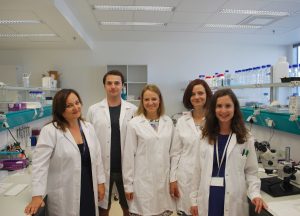
Neuronal plasticity is the ability of neurons to adapt permanent changes in response to environmental stimuli. This unique property of the nervous system allows for learning and memory formation.
At single-neuron level, plasticity is expressed by the activity of individual synapses, which in turn depends on the type of proteins locally synthesized at the synapse in response to stimulation. Some proteins present in dendrites and synapses are synthesized from mRNAs transported from the cell body in response to synaptic stimulation. Synaptic translation guarantees spatial and temporal control of protein synthesis, and a fast regulatory effect of the synthesized proteins on spine morphology and receptor signaling. This process has proven to be extremely important for the physiology of neurons. Its dysfunction leads to abnormalities observed in such disease syndromes as fragile X syndrome and autism, and is associated with abnormal spine morphology and connectivity.
The Laboratory of Molecular Basis of Synaptic Plasticity focuses on the identification of mRNAs and proteins undergoing local translation at the synapse in response to specific types of stimulation, and on gaining a better understanding of their synaptic functions. Our research will contribute to identification of key proteins important for synaptic plasticity. We use mouse models of human diseases, such as fragile X syndrome, which impair the process of local translation (FMR1 KO mice), as well as neuronal cell imaging techniques, biochemical and molecular methods, next-generation sequencing, and high resolution mass spectroscopy.

phone: +48 22 55 43721
room: 04.225
Selected publications:
- Matrix metalloproteinase 9 mRNA is translationally regulated by the Fragile X Mental Retardation Protein.
Janusz A., Miłek J., Perycz M., Pacini L., Bagni C., Kaczmarek K. and Dziembowska M., 2013.
Journal of Neuroscience 33, 18234-41. - High activity levels of MMP-9 in Fragile X syndrome are lowered by minocycline.
Dziembowska M., Pretto D.I., Janusz A., Kaczmarek L., Leigh M.J., Gabriel N., Durbin-Johnson B., Hagerman R.J., Tassone F., 2013.
American Journal of Medical Genetics. 161A, 1897-903. - Activity-dependent local translation of matrix metalloproteinase-9.
Dziembowska M., Milek J., Janusz A., Rejmak E., Romanowska E., Gorkiewicz T., Tiron A., Bramham C.R., Kaczmarek L., 2012.
Journal of Neuroscience 32, 14538-47. - MMP9: a novel function in synaptic plasticity.
Dziembowska M., Wlodarczyk J., 2012.
Int J Biochem Cell Biol. 44, 709-13. - Alternative pathway of transcriptional induction of p21WAF1/Cip1 by cyclosporine A in p53-deficient human glioblastoma cells.
Zupanska A., Adach A., Dziembowska M., Kaminska B., 2007.
Cell Signal. 19, 1268-78. - Cross-talk between Smad and p38 MAPK signalling in transforming growth factor beta signal transduction in human glioblastoma cells.
Dziembowska M., Danilkiewicz M., Wesolowska A., Zupanska A., Chouaib S., Kaminska B., 2007.
Biochem Biophys Res Commun. 354, 1101-6. - Cyclosporine a induces growth arrest or programmed cell death of human glioma cells.
Zupanska A., Dziembowska M., Ellert-Miklaszewska A., Gaweda-Walerych K., Kaminska B., 2005.
Neurochem Int. 47, 430-41. - A role for CXCR4 signalling in survival and migration of neural and oligodendrocyte precursors.
Dziembowska M., Tham T.N., Lau P., Vitry S., Lazarini F., Dubois-Dalcq M., 2005.
Glia 50, 258-69.
Magdalena Dziembowska, PhD, DSc
Alumni:
Group Leader:
Magdalena Dziembowska, PhD, DSc
Postdoctoral Fellows:
Magdalena Chojnacka, PhD
Bożena Kuźniewska, PhD Eng.
Marta Magnowska, PhD
Łukasz Samluk, PhD
Anna Skupień, PhD
PhD Students:
Piotr Ostapczuk, MSc
Aleksandra Stawikowska, MSc
Research Technician:
Jacek Miłek, MSc

Ranju Kumari, Tomasz M. Grzywa, Milena Małecka-Giełdowska, Karolina Tyszkowska, Robert Wrzesień, Olga Ciepiela, Dominika Nowis, Piotr Kaźmierczak
Int. J. Mol. Sci. 2022, 23(9), 5263
A Puścian, M Winiarski, J Borowska, S Łęski, T Górkiewicz, M Chaturvedi, K Nowicka, M Wołyniak, J J Chmielewska, T Nikolaev, K Meyza, M Dziembowska, L Kaczmarek, E Knapska
Mol Psychiatry . 2022 Jun;27(6):2766-2776
Lukasz Samluk, Piotr Ostapczuk, Magdalena Dziembowska
Molecular Biology of the CellVol. 33, No. 8
Chmielewska J.J., Burkardt D., Granadillo J.L., Slaugh R., Morgan S., Rotenberg J., Keren B., Mignot C., Escobar L., Turnpenny P., Zuteck M., Seaver L.H., Ploski R., Dziembowska M., Wynshaw-Boris A., Adegbola A . (2021)
Human Genetics and Genomics Advances, 2(3):100033
Joanna J.Chmielewska, Deepika Burkardt, Jorge Luis Granadillo, Rachel Slaugh, Shamile Morgan, Joshua Rotenberg, Boris Keren, Cyril Mignot, Luis Escobar, Peter Turnpenny, Melissa Zuteck, Laurie H. Seaver, Rafal Ploski, Magdalena Dziembowska, Anthony Wynshaw-Boris, Abidemi Adegbola
Human Genetics and Genomics Advances, 8;2(3):100033.
Alicja Puścian, Maciej Winiarski, Szymon Łęski, Łukasz Charzewski, Tomasz Nikolaev, Joanna Borowska, Jakub M. Dzik, Monika Bijata, Hans-Peter Lipp, Magdalena Dziembowska, Ewelina Knapska
Br J Pharmacol, 178(3):672-688.
Kuzniewska B., Cysewski D., Wasilewski M., Sakowska P., Milek J., Kulinski T.M., Winiarski M., Kozielewicz P., Knapska E., Dadlez M., Chacinska A., Dziembowski A., Dziembowska M.
EMBO Rep. (2020)
Rydzanicz, M., Wachowska, M., Cook, E. C., Lisowski, P., Kuźniewska, B., Szymańska, K., ... & Koppolu, A. (2018).
European Journal of Human Genetics, 27, 61-69.
Kuzniewska, B., Chojnacka, M., Milek, J., & Dziembowska, M., (2018).
Journal of neuroscience methods, 293, 226-233.
Kuzniewska, B., Sadowski, K., Urbanska, K., Urbanska, M., Kotulska, K., Liszewska, E., ... & Dziembowska, M. (2018).
Folia Neuropathologica, 56(3), 167-174
Szczałuba, K., Chmielewska, J. J., Sokolowska, O., Rydzanicz, M., Szymańska, K., Feleszko, W., ... & Bargeł, E. (2018).
Clinical genetics
Chmielewska, J. J., Kuzniewska, B., Milek, J., Urbanska, K., & Dziembowska, M. (2018).
Molecular neurobiology, 1-19
Jones, K., J., Templet, S., Zemoura, K., Kuzniewska, B., ... & Dziembowska, M. (2018)
Proceedings of the National Academy of Sciences, 115(15), E5805-E5814
Lepeta, K., Purzycka, K.J., Pachulska‐Wieczorek, K., Mitjans, M., Begemann, M., Vafadari, B., Bijata, K., Adamiak, R.W., Ehrenreich, H., Dziembowska, M. and Kaczmarek, L., 2017
EMBO molecular medicine, p.e201707723.
Jasińska, M., Miłek, J., Cymerman, I. A., Łęski, S., Kaczmarek, L., & Dziembowska, M.
Molecular Neurobiology, 53(7), 4701-4712.
Jasińska, M., Miłek, J., Cymerman, I. A., Łęski, S., Kaczmarek, L., & Dziembowska, M. (2015)
Molecular neurobiology, 53(7), 4701-4712.
Cymerman, I. A., Gozdz, A., Urbanska, M., Milek, J., Dziembowska, M., & Jaworski, J. (2015)
PloS one, 10(7), e0134018.
Zayat, V., Balcerak, A., Korczynski, J., Trebinska, A., Wysocki, J., Sarnowska, E., ... & Grzybowska, E. A., Dziembowska M. (2015).
DNA and cell biology, 34(1), 43-54.

Project number: 2019/34/H/NZ3/00733
Project title: The impact of cytoplasmic polyadenylation on local translation in neurons
Project Promoter: International Institute of Molecular and Cell Biology in Warsaw (IIMCB)
Project Investigator: Andrzej Dziembowski, PhD, Professor
Partners: University of Warsaw, New Technologies Center (UW); University of Bergen, Department of Biomedicine (UiB)
Team leader at the University of Warsaw: Magdalena Dziembowska, PhD, DSc
Source of funding: National Science Centre, Poland
Competition type: GRIEG
Total budget: 6 380 050 PLN
Budget UW: 1 931 925 PLN
Project duration: 01.09.2020 – 31.08.2023
About the project:
Synapses are specialized zones of communication between neurons directly involved in information processing and modulation. Synapses form small, semi-independent cellular compartments with their own local “on-demand” protein synthesis. Over the last several years, thanks to the development of RNA sequencing and imaging technologies, the knowledge about the synaptic transcriptome and proteome have progressed significantly, revealing that activity-induced protein synthesis in the synaptic compartment is a common phenomenon. However, at the molecular level, the mechanism by which synaptic translation of specific proteins is regulated is far from being understood. This is because the majority of current transcriptomic and proteomic datasets are largely descriptive, without uncovering mRNA-specific mechanisms of regulation. Mechanisms involved in local dendritic translation include translation initiation by the complex regulation of cap-dependent initiation factors, translational repression by the interaction of mRNAs bearing specific nucleotide sequences with their interacting proteins (such as FMRP), by binding microRNAs, or finally, by cytoplasmic polyadenylation. The regulation of protein expression by cytoplasmic polyadenylation in neurons was demonstrated for a few transcripts but was challenging to study due to the absence of reliable, quantitative methods. With the new emerging technology of direct RNA sequencing on nanopores, it is now possible to sequence entire mRNA molecules including the poly(A) tails. In the proposed project we will employ this method to characterize the genome-wide mRNA poly(A) tail dynamics during neural activity-dependent synaptic plasticity. This initial discovery stage will be followed by analyses of synaptic activity-dependent protein synthesis and plasticity. After identifying the fraction of synaptic mRNAs that undergo cytoplasmic polyadenylation, we will search for enzymes responsible for this process using in-house generated unique KO and knock-in mouse models. Finally, we aim to elucidate mechanisms by which specific mRNAs are selected for cytoplasmic polyadenylation. In sum, this project, thanks to a combination of contemporary transcriptomic approaches with functional studies on mouse KO models, will provide the first comprehensive picture of the role of cytoplasmic polyadenylation in the regulation of local protein synthesis at synapses. The expertise of three partners from Poland and Norway is indispensable for the success of this project.
![]()
![]()


